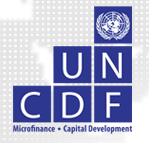The United Nations Capital Development Fund (UNCDF) released a policy note, titled “Inclusive Future: Inequality, Inclusive Growth and the Post-2015 Framework,” which addresses: why inequalities matter; different dimensions of inequality; integrating inequality into the post-2015 framework; and the way forward towards an inclusive future.
 27 March 2013: The United Nations Capital Development Fund (UNCDF) released a policy note, titled “Inclusive Future: Inequality, Inclusive Growth and the Post-2015 Framework,” which addresses: why inequalities matter; different dimensions of inequality; integrating inequality into the post-2015 framework; and the way forward towards an inclusive future.
27 March 2013: The United Nations Capital Development Fund (UNCDF) released a policy note, titled “Inclusive Future: Inequality, Inclusive Growth and the Post-2015 Framework,” which addresses: why inequalities matter; different dimensions of inequality; integrating inequality into the post-2015 framework; and the way forward towards an inclusive future.
Noting highly uneven progress towards the Millennium Development Goals (MDGs) across and within regions and countries, the note highlights, inter alia, that many developing countries have enjoyed relatively high rates of growth – largely driven by foreign direct investment, open markets and development assistance – but that generally only a small part of the population benefits from such growth. It also shows that inequalities affect both developing and developed countries, with an increase in inequalities in most countries of the Organisation for Economic Co-operation and Development (OECD) from the mid-1980s to late 2000s.
The note distinguishes between three levels of inequality: global; between countries and within countries; and between individual, territorial, gender, financial and digital dimensions. It underlines that inadequate finance, lack of focus and of targeted interventions have contributed to exclude the poorest regions and groups from making progress towards several MDGs. It recommends addressing, inter alia: gender inequality; and access to mobile technology and broadband internet.
The note calls for addressing inequality as an integral part of the post-2015 framework, either as a stand alone goal that would integrate dimensions of inequality or as targets and indicators reflected across goals. It also acknowledges challenges in doing so, including measuring inequality, accessing reliable and timely data and tackling technical and political barriers.
The note proposes several ways forward, including: targeted investments; smart official development assistance (ODA); education at all levels; job training and retraining; access to information and communication technologies (ICTs); innovative financing; legal regulations to guarantee representation and participation; and judicial reforms to ensure fair access to justice.
The report draws on a workshop, titled “Inequality, Inclusive Growth and the Post-2015 Framework,” convened by UNCDF, the UN Department of Economic and Social Affairs (DESA) and the UN Development Programme (UNDP) in New York on 7 March 2013. Inequalities is one of 11 themes being addressed by the UN Development Group’s (UNDG) global consultations on the post-2015 agenda. [Publication: Inclusive Future: Inequality, Inclusive Growth and the Post-2015 Framework] [UN Press Release] [UNCDF Press Release] [Workshop Website] [Inequalities Consultation Website]